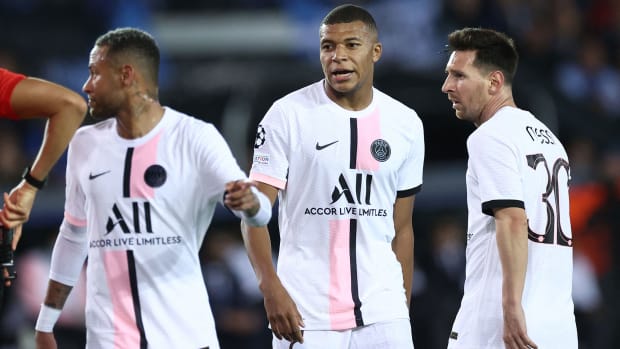City's rout of Leipzig was not without concern, while PSG debuted its all-world trio in a dud of a draw at Club Brugge, kicking off the road that both hope ends in the final.
Amid all the (justified) fretting about the financial state of modern football, the sharp stratification of the game, there remains one saving grace. It may not last for long and once it has gone it may never come back. But perhaps football’s greatest strength is that it remains profoundly contrarian. It is a capricious sport that seems to enjoy nothing more than puncturing the expectations and desires of those who seek to control it.
Sheikh Mansour took over Manchester City in 2008, and since then the club has spent a little over $1.75 billion net on players. Qatar Sports Investment took over Paris Saint-Germain in 2011, and since then the club has spent a little over $1.1 billion net on players. And yet neither has won the prize its owners cherish the most: The Champions League title.
They are getting closer. PSG lost in the 2020 final. Man City lost in last season's final. And yet even last season, when the financial impact of the pandemic had begun to exacerbate the problems the traditional elites were already having keeping up with the state- and oligarch-run clubs, it was another petroclub, Chelsea, who emerged from the pack to win the Champions League. Chelsea, now with a reliable forward in Romelu Lukaku to complement a supremely well-structured midfield, will be a major threat to repeat, but it is PSG and City who are the favorites as the group stage begins, despite Wednesday's results perhaps exposing some flaws in their respective Death Stars.
Man City’s Champions League exits have followed a clear pattern. There were the chaotic away-goals defeats to Monaco in 2017 and Tottenham in 2019 when City was undone repeatedly on the break. And there were the defeats to Liverpool in 2018, Lyon in 2020 and Chelsea in 2021 when tactical tweaks by Pep Guardiola apparently aimed at heading off the threat of the opposition's counterattack unsettled his side and led to defeat. He had, to use the popular phrase, overthought it.

Richard Heathcote/Getty Images
Yet the oddity of what happened in the final last season is that, after an iffy start, City had been highly effective at shutting down opponents' counters. It had become slightly more cautious, usually managing to retain five men behind the ball and usually playing with a double pivot—until the final when it played with no pivot at all. In that sense, what happens in the group stage says little about City’s overall chances. The danger is less an RB Leipzig in transition after the departure of its coach and three significant senior players than it is Guardiola overcomplicating a highly effective system against a high-class opponent.
In that regard the openness of Wednesday's game will be a concern. A 6–3 win over Leipzig that featured some stellars goals was comfortable enough, but this felt worryingly like the first leg of that defeat to Monaco four years ago: A game that was thrillingly open, but that offered no sense of the sort of control that is probably necessary to win the Champions League.
That PSG is so favored seems largely rooted in the belief that Lionel Messi is good enough to carry it that extra step that has been missing in the past two seasons. Perhaps he is, but the issue for PSG is less the forward line, which has been star-studded for years, than the midfield and defense. In that sense, bringing in Sergio Ramos (who has yet to play for the club as he overcomes injury) and Achraf Hakimi, even Georginio Wijnaldum, may be more significant than the Messi signing.

Kenzo Tribouillard/AFP/Getty Images
Barcelona has suffered a series of heavy defeats in recent years—to PSG twice, Juventus, Roma, Liverpool and Bayern—because its forward line fails to protect its midfield. Messi had become not only a panacea but also a problem. He did save Barça frequently, but his reluctance or inability to press exposed an aging midfield. With Neymar and Kylian Mbappé also less-than-enthusiastic pressers, there are serious dangers for the PSG midfield.
Again, Club Brugge, PSG's opponent Wednesday, should not really have been a test of that. But as it turned out, PSG was poor in Belgium, lacking cohesion in the final third, playing generally sluggish and being outplayed for long periods. PSG shouldn’t be in any danger of elimination in the group stage thanks to Leipzig’s problems, but this was not the performance of a side about to win the Champions League. There is plenty of time, of course, to put that right, and this was the first time the Neymar-Messi-Mbappé forward line had played together—Mbappé limping off injured after 51 minutes did not help matters, either—but there will have to be a major improvement and a complete acclimation period if PSG is to be a threat.
City, perhaps, can think that it can tighten up with a couple of tweaks; PSG, at the moment, looks far further from a viable challenger, though it will need time to gel. When the two financial behemoths meet in two weeks at the Parc des Princes, we'll perhaps get a better gauge on which, if either, stands a chance at playing May 28 in the final in St. Petersburg with the ability to realize its title-obsessed owners' dream.
More Soccer Coverage:

0 Comments:
Post a Comment